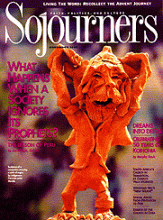The truth about the largest mass killing of El Salvador's 12-year civil war may finally be getting a public airing--and perhaps even a little justice to go along with it.
The Truth Commission created as part of El Salvador's peace accords to investigate political crimes committed during the war--the most prominent are the assassinations of Archbishop Oscar Romero and of the six Jesuits and their coworkers--arrived in Ciudad Segundo Montes in mid-July to hear about a less publicized but equally shocking atrocity: the Mozote massacre.
More than 1,000 people--most of them women, children, and elderly men--were brutally slaughtered by Salvadoran soldiers in the remote mountain village of El Mozote and surrounding hamlets during a three-day rampage that began on December 11, 1981. The Salvadoran military had accused the victims of being leftist guerrillas or rebel sympathizers.
The massacre was carried out by the elite Atlacatl Battalion, which was trained by U.S. Green Berets at Ft. Benning, Georgia, for several months before the slaughter. The same unit was later implicated in the November 1989 Jesuit killings.
The Mozote investigation is considered key to El Salvador's fragile peace process and efforts to end impunity by holding military and government officials responsible for crimes they commit. If there is no justice in the Mozote case, human rights activists warn, there may be no lasting peace in El Salvador.
The case remains shrouded in controversy. Salvadoran officials deny a massacre occurred and U.S. officials have expressed their own doubts. Many Salvadorans, conditioned by their media's portrayal of the security forces as altruistic defenders of democracy, believe the authorities. No one has ever been charged or convicted in the case. However, justice--or at least a public exposure of the truth--may be soon in coming.
Read the Full Article

